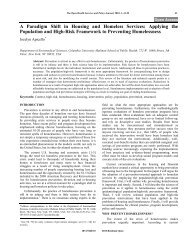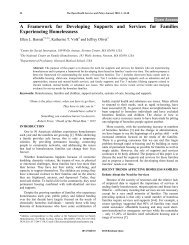international conference on street children and street children's
international conference on street children and street children's
international conference on street children and street children's
You also want an ePaper? Increase the reach of your titles
YUMPU automatically turns print PDFs into web optimized ePapers that Google loves.
Mainl<strong>and</strong> <strong>and</strong> Zanzibar. However, most of the direct acti<strong>on</strong>s to help <strong>street</strong> <strong>children</strong> are<br />
being undertaken by N<strong>on</strong>-Governmental organizati<strong>on</strong>s <strong>and</strong> religious organizati<strong>on</strong>s.<br />
African governments appear incapacitated or slow to address the problem of<br />
<strong>street</strong> <strong>children</strong>. This in part stems from the fact that little is known about <strong>street</strong> <strong>children</strong>.<br />
Even with a Ministry for women <strong>and</strong> <strong>children</strong>, government departments often lack<br />
comprehensive <strong>and</strong> reliable data <strong>on</strong> <strong>street</strong> <strong>children</strong>. A study carried out by UNICEF in<br />
1999 indicated that the literature <strong>on</strong> <strong>street</strong> <strong>children</strong> in Tanzania is relatively small <strong>and</strong><br />
repetitive (UNICEF, 1999). It is therefore in our view very difficult if not impossible for<br />
effective government acti<strong>on</strong> without reliable <strong>and</strong> up-todate data. Data <strong>on</strong> <strong>street</strong><br />
<strong>children</strong> is by itself not sufficient to find a lasting soluti<strong>on</strong> to the problem of <strong>street</strong> <strong>children</strong>.<br />
Nati<strong>on</strong>al Child Development Policies <strong>and</strong> strategies are a necessary requirement.<br />
Tanzania has been able to formulate <strong>and</strong> put in place a Child development Policy that<br />
was adopted by the government in 1996. This document is however very generalized<br />
<strong>and</strong> fails to identify <strong>street</strong> <strong>children</strong> as a special category requiring special attenti<strong>on</strong>.<br />
There is growing need for African countries to formulate <strong>and</strong> implement dynamic child<br />
development policies if we are serious to deal with the problem of <strong>street</strong> <strong>children</strong>.<br />
Africa is ignoring the Problem of Street Children:<br />
The traditi<strong>on</strong>al resp<strong>on</strong>se to <strong>street</strong> <strong>children</strong> by most governments in Africa <strong>and</strong><br />
elsewhere has been repressi<strong>on</strong>. Street <strong>children</strong> arrested for a minor theft or roaming<br />
around (uzururaji) are often held in custody until somebody can be found to take<br />
resp<strong>on</strong>sibility for them. This can take weeks or m<strong>on</strong>ths. Detenti<strong>on</strong> in harsh circumstances<br />
is the comm<strong>on</strong> lot of <strong>street</strong> <strong>children</strong> every where. This tells us more about the real attitude<br />
of governments than any examinati<strong>on</strong> of nati<strong>on</strong>al legislati<strong>on</strong>.<br />
Today governments are increasingly taking ruthless steps to clear the <strong>street</strong>s of<br />
<strong>street</strong> <strong>children</strong> <strong>and</strong> other unscrupulous characters. They do not offer any viable<br />
alternative to the <strong>street</strong>. Politicians, policy makers, <strong>and</strong> urban planners seem to be<br />
11
















